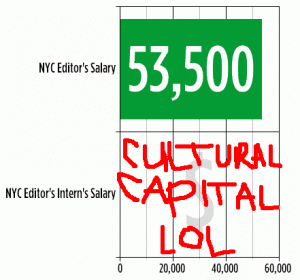A linear look at the best of the year from our “Blog” section
Part 1 is here
July 11 The Full Stop Doomsday Clock: Jack and Jill – Jesse Montgomery
In recent weeks, the editors at Full Stop have considered instituting a Doomsday Clock that would monitor and index our culture’s seemingly inexorable march toward barbarism. But, due to general laziness and detachment on our part such a Clock failed to materialize.
However, in the wake of the horrific announcement made last Friday regarding the release of Adam Sandler’s latest film Jack and Jill, we feel that such a silence can not longer be maintained in good conscience.
August 4 Book Reviews Demystified – Eric Jett and Alex Shephard
confirms ___ as one of America’s most ___ authors: this is the third book by an author you’ve never heard of.
darkly funny: the word cripple appears more than once.
dazzling: the writer has an MFA from a top 100 program.
deft: the writer has an MFA from a top 20 program.
disappointing: the author slept with my spouse before we were married.
epic in scope: the author needs a better editor.
finely tuned: short sentences about sober people watching their neighbors.
flawed: this book is similar to the book I was planning to write.
August 12 How Much Do Interns Earn? – Alex Shephard
August 18 AWP (Association of Writers & Writing Programs) 2012 Conference Schedule – The Editors
9:00 a.m.-9:30 a.m.
Third Floor Coat Room Minimum Wage: A Privilege, Not a Right. Learn the basics of the unpaid internship. We’ll answer questions like: Is it okay to question your superiors? (Nope.) Will a sexual harassment suit hurt your chances of receiving a recommendation? (Of course it will!)
10:00 a.m.-12:00 p.m.
Pool Pregret: Living A Life Ripe For Memoir. Think you have to be unique or important to write a memoir? Guess again. Our panelists will help you cultivate a variety of addictions, illnesses, and eccentricities, including: former Double Dare contestant, Andy Milonakis lookalike, jello veins, fake synesthesia, uncredited writer of “Ruff Ryders Anthem,” grandpa was a lemonade stand, homeless child-clown, home alone, disgruntled scrivener, boy who lived. Plus, the five quickest ways to develop terminal cancer. B7 (Margaret Hirschberg’s Mother’s Basement) Subverting the Conventions of Genre Fiction.Vampires who eat garlic. Zombies who eat tofu. Our panel of genre benders will discuss ways to resurrect even the most hackneyed of archetypes. Bring snacks. Raymond Carver Bar & Grill Plots that Always Work. Faculty members from top MFA programs discuss the essential elements of a successful story, including weird neighbors, siblings with drinking problems, precocious children, broken dicks, robot sidekicks, and detectives addicted to dog meat.
September 23 Amazon: Fuck Amazon – Catie Disabato
Up until now, most of Amazon’s bad press came from people inside the publishing industry, people who dealt with Amazon as a corporation rather than people who dealt with it as a store. Amazon is very, very good to their customers and even if the customers were aware of Amazon’s shady business practices, the victims seemed like entities (governments unable to collect taxes, bookstore chains going out of business, publishing houses getting strong armed) not like people. Now, Amazon is hurting individual humans, who probably resemble the humans that buy from Amazon. For the first time, Amazon could be seen as hurting their own customers. This perception of Amazon as an aggressor against people not just companies might not catch on – I hope it does, but that hope is dim.
October 17 Reading A Book By Its Cover – Nika Knight and Kelly Schmader
October 25 We were young, it was beautiful – Helen Stuhr-Rommereim
Boym writes “Nostalgia is a rebellion against the modern idea of time, the time of history and progress. The nostalgic desires to obliterate history and turn it into private or collective mythology.” It has the counter-revolutionary quality of stopping time and framing the past, just when forward movement is most important.
Around the time Zizek was talking to occupy Wall Street, I was sitting in a dark movie theater thousands of miles across the ocean in Egypt, watching tear-jerker documentaries of the 18 day uprising that ousted Hosni Mubarak, one after another at the Alexandria Film Festival. Most of the films were made in the late spring of this year, only weeks after the end of the uprising. Most present the same story: a glorious build-up of protest, outrageous lies from state-controlled media, hilarious and inspiring chants, culminating in a heartbreaking moment of victory for the masses. And as Egypt post-January 25 becomes less and less rosy, watching such films feels not just painful, but painfully unhelpful and unproductive.
“We were young, it was beautiful,” and it only happened a few months ago.
October 27 The Presidents of the United States of America, Sorted Into Hogwarts Houses – Alex Shephard
26. Theodore Roosevelt – Gryffindor
27. William Howard Taft – Ravenclaw
28. Woodrow Wilson – Ravenclaw
29. Warren G. Harding – Hufflepuff
30. Calvin Coolidge – Hufflepuff
31. Herbert Hoover – Hufflepuff
32. Franklin D. Roosevelt – Gryffindor
33. Harry S. Truman – Gryffindor
34. Dwight D. Eisenhower – Gryffindor
35. John F. Kennedy – Gryffindor
36. Lyndon B. Johnson – Slytherin
37. Richard Nixon – Slytherin
38. Gerald Ford – Hufflepuff
39. Jimmy Carter – Hufflepuff
40. Ronald Reagan – Gryffindor
41. George H.W. Bush – Ravenclaw
November 1 Would Sam Johnson Blendr a Biddy? – Noah Kumin
On the other hand, it’s helpful to remember that in his preface Johnson is defending the need for an English dictionary at all. If there is no truth to his claim—that a dictionary ought to preserve the best of a language, for that is what the best of its literature is fashioned from—then what is the purpose a dictionary? Why preserve arcane words or grammar rules that no one follows in speech anyway? Society would not cease to function without good prose. Sugar would be no less sweet; the packaging it comes in, no less branded. Why not just ditch the whole thing, grubhub a snack, tivo some hulu, bbm a buddy or blendr a biddy, and call it a night?
November 20 Learn This Word – Lucas Brown
The absurdity of this excuse is obvious in every video of the event, because Lt. John Pike steps over the students’ line to start the pepper-spraying. Pike appears to provide the vast proportion of abuse by himself, staining the reputation of his colleagues.
Katehi has organized a “task force” to report back to her with recommendations in 90 days. Does it really take 90 days to understand that this was unnecessary? Does it take 90 days to say, “I was wrong”?
I know Katehi’s lawyers must be advising against admitting culpability, since the university could be held liable for costly court cases. But has our society become so litigated to death that we cannot admit that such brutality is just a wrenchingly awful mistake?
December 7 Open World: What Skyrim Taught Me About Unemployment – Paolo Roy
The path to success has been littered with obstacles — age, experience, economy. The job market for creative young adults has run dry. Skyrim was my escape from the economy; five days into it, I saw hope.
How could I say I needed a job, when I had so many? I was an assassin, a forager, a thief, a blacksmith, a merchant, a shaman, and an archaeologist. In the five days I spent playing Skyrim, I had logged 40 hours — a workweek of exploring dungeons, recovering lost artifacts, crafting enchanted necklaces, pickpocketing people in every new town, and selling my stolen goods back to a fence at the Thieves Guild. This life was profitable.
If I wanted a potion I saw at a store, I could wait for the merchant to close shop, follow him home, pick the lock to his house, hide in his basement while he finishes dinner, steal his shop keys in his sleep, go back to his store, and take every potion I want. Or, of course, I could kill him on the spot.
Skyrim not only allowed such autonomy; it demanded it. As an open-world game, it lacks a linear storyline, and rewards users for veering off of the main path. It insists upon complete user freedom, and implements an economy that supports that.
When I’m low on cash, I can visit the nearest inn and tell the innkeeper, “I’m looking for work. Can you help me?” The answer is always “yes.” There’s no searching Craigslist, no emailing resumes, and definitely no W-2 forms. Potential employers in Skyrim never need to check my references. And there is no shortage of jobs. I indulge my every whim, stealing horses, spending my savings on mead and swords. Skyrim exposes the paradox of utopia; a perfect world is only made possible by an imperfect one.
December 20 The End of Iraq and Innerlichkeit – Scott Beauchamp
And so keeping all of this in mind, let me make a real ass out of myself by trying to predict the future. I think that the art, especially the writing, that comes out of these wars, experienced by about 1% of 1% of the country, misapprehended by many more, and, now, ignored by a majority, will along with the political disaffection and economic dislocation of the returning soldiers, create a less outward looking art. There won’t be as much Liberal or Radical reexaminations of the sociological guts of this thing or political finger pointing. Nope. No Catch-22s or All Quiet on the Western Fronts. Instead, I think there will be a profound collapse into oneself. A folding in. Less a retreat than an avalanche or cave-in. A turn inward against a world that, even worse than just not caring, has no way of understanding.
Germans had their own similar period (1870-1933) when a term that’s kind of difficult to translate dominate art and culture. Innerlichkeit, a tendency to withdraw from or be completely indifferent to politics, instead seeking almost revelatory knowledge inside the subjective experience. The inner world being more ‘real.’ I think the best example of war writing in this vein is Storm of Steel, or Stahlgewittern, by Ernst Junger. In it, war becomes, not a confluence of political forces and personalities, but instead a sublime, mystical, and idiosyncratically individual experience. He’s all about the elevation of war to a completely internal event. And in its way, it’s a pessimism that can only truly be understood outside of itself, almost by definition.
I make this prediction because I fight against these tendencies in myself. I know, that’s a very American reason to reach a German conclusion, but there it is. And so here’s another 1%, a forgotten minority, alienated from the rest of the generation, lost and apart. The war is over, a few of my friends are dead, and I never really wanted a parade anyway.
This post may contain affiliate links.










